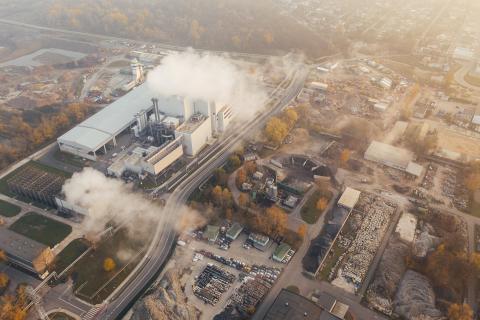Reactions to the accuracy of Exxon's climate change predictions since the 1970s
Research published in Science assesses for the first time quantitatively the climate projections made by scientists at oil company Exxon and ExxonMobil Corp between 1977 and 2003. According to the study, most of their projections accurately predicted warming consistent with subsequent observations. However, the authors point out that the company's public statements contradicted its own scientific data.

Pepe - Exxon
Pep Canadell
Executive Director of the Global Carbon Project and Senior Research Fellow at the CSIRO Climate Science Centre in Canberra, Australia
The study confirms what we have known all along, that those who are affected by the clean energy transition - the big fossil fuel companies - will do everything they can to confuse the public and slow down the decarbonisation process.
By protecting their own economic interests, these companies are responsible for millions of premature deaths due to pollution and climate change impacts that they have concealed.
It is important that court cases against these companies move forward to prevent future abuses by corporations, which often have more information than governments and the public themselves.
Ernesto - exxon
Ernesto Rodríguez Camino
Senior State Meteorologist and president of Spanish Meteorological Association
This publication comprehensively reviews the publications of ExxonMobil oil company scientists since the late 1970s. From the point of view of climate science, the article does not add anything substantially new to what is currently known about the evolution of climate and the primarily anthropogenic causes of current climate change. However, the article is very relevant as it sheds much light on the large gap that existed at the time the publications - both peer-reviewed and the company's own internal scientific papers - were written between ExxonMobil's communication strategy and what was known internally on the subject.
The warming projections estimated by ExxonMobil scientists differed little from similar studies conducted and published between 1970 and 2007 by other academic and governmental institutions, and which were independently derived with different models. In this sense, the authors of this work conclude that the company's scientific team knew as much about the subject as the rest of the scientific community, which demonstrates the extent to which the scientific community progresses in parallel and feeds back on results and advances of groups working independently in the same field of activity.
What is really important about this work is that it shows very clearly the dichotomy that existed between the company's scientific department and those responsible for the company's communication strategy. While the scientists' results were perfectly in line with those obtained by other national and international groups, the company's communication strategy overemphasised the uncertainties, the limitations of climate models, the indiscernibility of anthropogenic warming and natural variability, and downplayed or even denied the role of fossil fuels as a fundamental cause of current climate change.
The ExxonMobil scientists also calculated the maximum amount of CO2 that could still be emitted into the atmosphere, mainly from fossil fuel use, to avoid a warming of more than 2°C above pre-industrial times, which is the upper limit of acceptable warming under the Paris Agreement. They estimated a range of maximum CO2 emissions (between 2015 and 2100) from 251 to 716 gigatonnes of carbon. Recent research has narrowed the range somewhat, but the ExxonMobil scientists' estimates are essentially consistent with the generally accepted range.
Ultimately, the paper shows that the conclusions drawn by ExxonMobil scientists with their own climate models showed warming (due to greenhouse gas emissions mainly caused by massive fossil fuel use) that was consistent with those of the rest of the scientific community.
This study is the first to address the quantitative aspects of the work developed by the company's scientists and is in stark contrast to the company's own communication strategy, which is based on sowing doubts and exaggerating uncertainties in order to delay any kind of climate action in response.
Anna Cabré - Exxon EN
Anna Cabré
Climate physicist, oceanographer and research consultant at the University of Pennsylvania
ExxonMobil, an oil company, already knew in the 1970s that carbon dioxide emissions from its business caused global warming and climate change, which was proven in 2015 when confidential documents were discovered. Despite this, ExxonMobil launched a large-scale disinformation campaign that continues today (albeit with a different focus), casting doubt on the predictions of academic research. Now, Supran, Rahmstorf and Oreskes have analysed ExxonMobil's internal climate models and compared them with models published in scientific journals at the time.
Not only did ExxonMobil know that their operations created higher temperatures and a longer interglacial period, but their predictions and uncertainties were as accurate as those published in academia, they knew when significant human-caused warming would be detected and the amount of carbon dioxide that could be released before reaching 2 degrees of global warming.
The relevance of this study lies in its accountability to the law and to the general public, who also deserve the truth. Knowing that something is happening is not the same as knowing with certainty. Dr Naomi Oreskes is a historian of science and an expert on the role of oil companies in climate change and in delaying the implementation of solutions. ExxonMobil chose to lie, to spread uncertainty as a marketing strategy, and this has to have legal consequences. Although we know that science cannot be completely objective, as it is shaped by our culture, knowledge, biases and systemically dominated by Western thinking and colonialism, scientists in general follow a code of ethics that was ignored in this case.
This article also reminds us that science does not live in isolation in a parallel world, but participates in and informs decisions that can change the course of our future, so perhaps the history of science should be a compulsory subject in all science degrees.
- Research article
- Peer reviewed



